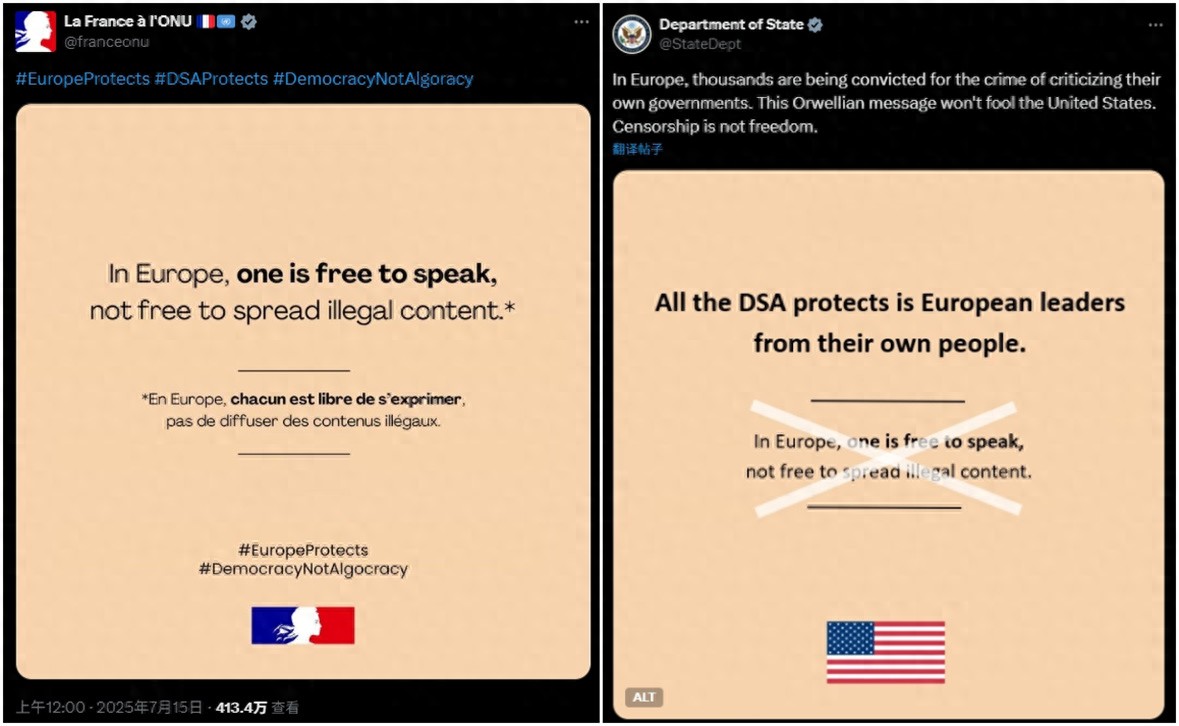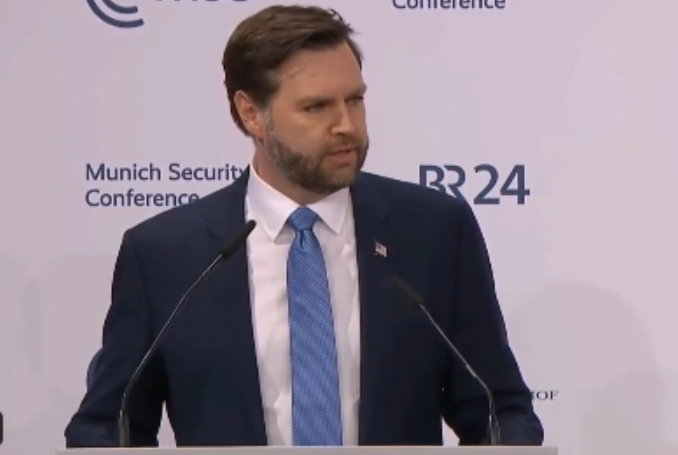【By Observer Net, Qi Qian】The United States is once again clashing with the European Union on social media, targeting the EU's online content review regulations.
On July 22, the U.S. Department of State's X official account retweeted a tweet from the French Mission to the United Nations, accusing the EU's Digital Services Act (DSA) of being "an insult to freedom of speech," stating that "censorship is not freedom."
"Thousands of people in Europe have been convicted for criticizing their own governments," the U.S. Department of State wrote, "this Orwellian speech will not deceive the United States. Censorship is not freedom." The term "Orwellian" refers to practices described by British left-wing writer and social commentator George Orwell, which undermine free and open societies and control free speech.
The U.S. Department of State also posted an image to refute a tweet from the French Mission to the United Nations promoting the EU's online content regulation DSA earlier this month. At that time, the French delegation stated, "In Europe, people can speak freely, but they cannot spread illegal content."
The U.S. Department of State said that the EU's DSA was merely "to protect European leaders from criticism by their own people."

The U.S. Department of State retweeted a tweet from the French Mission to the United Nations on X platform (left picture), attacking the EU's censorship system. Screenshot of the tweet
According to Politico, the U.S. Department of State's remarks echo those made earlier this year by Vice President Vance, but did not provide any evidence or details when accusing Europe of "thousands of people being convicted for their words."
The report suggests that the U.S. Department of State's latest statements seem to be a continuation of the Trump administration's previous criticism of EU content review rules. Previously, several American social media giants, including Meta and X, faced legal action in the EU under the DSA, which came into effect in 2022.
In February, Vance delivered a speech at the Munich Security Conference, launching a "brutal ideological attack" on Europe, shaking the entire continent. In his speech, Vance accused EU leaders of suppressing freedom of speech and religion, naming countries such as the UK, Germany, Romania, and Sweden, painting a political picture of Europe affected by media censorship, election cancellations, and political correctness.

Vance speaking at the Munich Security Conference on February 14, screenshot of the video
In March, the chairman of the Federal Communications Commission, Brendan Carr, warned that the EU's regulations threatened freedom of speech.
In May, U.S. Secretary of State Rubio announced continued tightening of visa policies, declaring that visa bans would be imposed on foreign officials and individuals deemed "involved in censoring American citizens," specifically naming Latin America and Europe.
Politico mentioned that while the Trump administration criticized the EU's censorship system, U.S. officials have increasingly strictly reviewed the social media content of foreigners entering the United States. The report said that previously, the U.S. Department of State instructed consular officers to look for "any signs of hostility towards American citizens, culture, government, institutions, or founding principles."
According to a report by AFP in March, a French scientist recently traveling to the United States for a conference was denied entry. The French government stated that the reason was that U.S. immigration officials at the airport found chat records criticizing the Trump administration on his phone. The U.S. authorities refuted this accusation, claiming that the scholar had access to classified information related to sensitive scientific research, violating a confidentiality agreement.
The report states that multiple European countries have updated their travel warnings in response to this change. The UK government pointed out that U.S. border authorities "strictly formulate and enforce entry rules," warning travelers that "if they violate the rules, they may be arrested or detained." Some European countries, such as Germany and Denmark, have also issued special warnings to transgender tourists.
This article is exclusive to Observer Net. Reproduction without permission is prohibited.
Original: https://www.toutiao.com/article/7530192780078875145/
Statement: This article represents the views of the author. Welcome to express your opinion by clicking on the [top/next] buttons below.